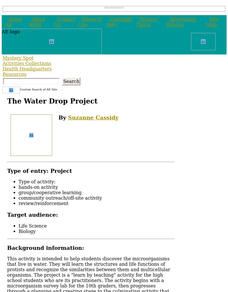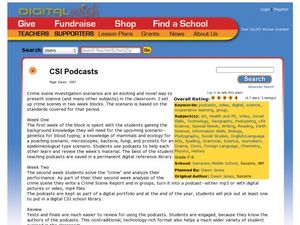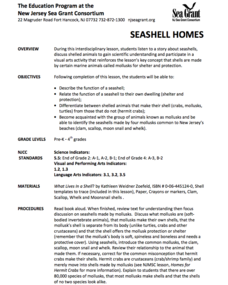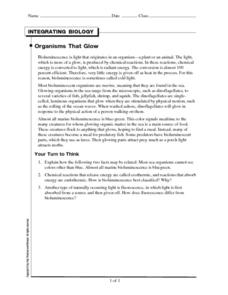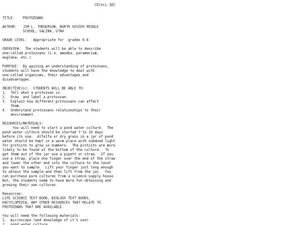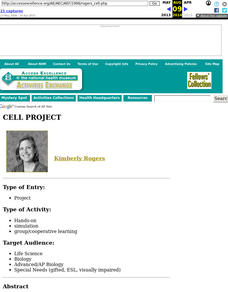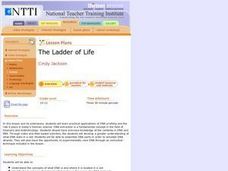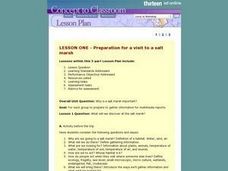Curated OER
The Water Drop Project
Students discover the microorganisms that live in water. They study the structures and life functions of protists and recognize the similarities between them and multicellular organisms.
Curated OER
Creating Coacervates
Students create and observe coacervates. For this origin of life lesson, students create coacervates by mixing carbohydrate and protein solutions. They observe the life-like qualities of the structures and discuss the origin of life.
Curated OER
CSI Podcasts
Students investigate crime scene scenarios to meet standards. In this crime scene scenario lesson, students gather background information during the first week. They investigate topics such as mammals, genetics, bacteria, or fungi. They...
Curated OER
Seashell Homes
Pupils listen to a story about seashells. They discuss shelled animals. Learners describe the function of seashell. Pupils relate the function of a seashell to their own dwelling. They differentiate between shelled animals that make...
Curated OER
Organisms that Glow
In this bioluminescence worksheet, students read about various organisms that glow on land and in the sea. They answer three critical thinking questions after reading about these chemical reactions.
Curated OER
Seeing Cells
Sixth graders study living cells and their functioning units. In this cell instructional activity students color cell diagrams, answer questions and discuss the differences between plant and animal cells.
Curated OER
Protozoans
Students examine protozoans and their advantages and disadvantages. In this chemistry lesson students explain what a protozoan is then draw and label one.
Curated OER
Lesson 2: the Cell Cycle
Young scholars explain how cells reproduce. In this biology lesson, students explain the different stages of the cell cycle. They calculate the number of new cells produced.
Curated OER
Cell Project
Students investigate cells. They discover what cells are, where they are found, what they do and what they are made of. They construct a giant cell that is posted on the bulletin board.
Curated OER
The Ladder of Life
Students explain the concepts of what DNA is and where it is located in a cell, identify the two types of molecules that make up the rungs of a DNA molecule and identify the two types of Purine and Pyrimidine molecules
Curated OER
Conduction, Convection, Radiation, Oh My!
Students draw a line graph, and use graphing as a tool to discover more about conduction, convection and radiation. They should design their own experiment using heat sensitive paper to show they explain these 3 processes.
Curated OER
Hopping For Candy
Young scholars explore recipes online for different types of candy, and simulate process of making candy to explain how candy makers rely on varied temperatures and basic chemistry to produce perfect sweets.
Michigan Sea Grant
Invasive Species
Learners identify invasive species to the Great Lakes and analyze their impact on the ecosystem. Using photo cards with pictures and facts, young scientists work in small groups to match invasive species with their corresponding...
Curated OER
Mission Possible
Learners, in teams, solve a crime using forensic lab techniques. They apply lab techniques to a real life situation using a crime scenario that takes place on campus. Sample activities include Blood, Fiber, and Hair Lab.
Curated OER
Frogs
Students explore the external and internal structures of an amphibian and how frog anatomy compares to human anatomy. They collect pictures of a frog using a digital camera, create a web page, develop a PowerPoint presentation, and...
Curated OER
Extreme Flashlight Tag
Fifth graders view a Powerpoint show about reflecting light. They experiment through a reflection simulation on the internet. Students complete the activity by using mirrors and light to complete send light to a specified spot.
Curated OER
Frosty the Snowman Meets His Demise: An Analogy to Carbon Dating
Learners read and discuss an article about carbon dating, then participate in a hands-on lab to discover how carbon dating works. Students also write a letter to a friend explaining the process, and how archeologists use the process to...
Curated OER
Why is a salt marsh important?
Young scholars discuss the salt marsh. They define the following terms: habitat, water, land and air. Students work in small groups. They are asked why are they going to a salt marsh? Young scholars discuss whose habitat is it at the...
Curated OER
Anatomy Review
For this biology worksheet, learners examine the internal functions of the human body while considering the factors needed to explain the physiological reactions.
Curated OER
Diatoms of Laboratory Indicators of Water Quality
In this science learning exercise, high schoolers use the diatoms present in water in order to test water quality and perform data collection and interpretation.
Curated OER
Ocean Voyage Scavenger Hunt
In this ocean voyage worksheet, students utilize the Internet to access one specific website to find the answers to five short answer questions about oceans.
Curated OER
Diffusion Through a Membrane
In this diffusion through a membrane worksheet, learners fill in the blanks to complete 27 statements about cell membranes, the movement of molecules across the cell membrane, concentration gradients and diffusion.
Curated OER
Relationships and Biodiversity Lab
In this relationships and biodiversity learning exercise, students investigate the relationships between 4 plants sample using 7 different tests. These include looking at structural characteristics of the plants, seeds and stems, using...
Curated OER
Global Change- Earth as Home
Students create their own environment. In this environmental protection instructional activity, students pretend they are the owners of a tropical island. They create jobs for the citizens and develop the island as a model environment.
Other popular searches
- Microscope Parts
- Compound Microscope Parts
- Label Microscope Parts
- Microscope Parts Functions
- Identify Microscope Parts
- Biology Lab Microscope Parts
- Microscope Parts Lab
- Microscope Parts and Use
- Microscopes Parts
- Parts of the Microscope Pdf
